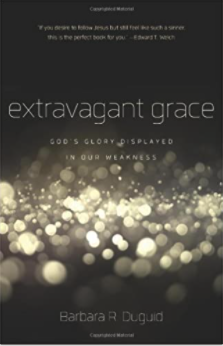Extravagant Grace: God’s Glory Displayed in our Weakness
Christians are those who are trusting in the person and finished work of Jesus Christ and as a result have been declared righteous before the holy triune God.

This is certainly good news! A result of this is a transformed life that then grows more and more into the likeness of our Savior, Jesus Christ. So why is it then that Christians still struggle with sin?
Why are there times we feel weak and defeated, depressed, and overwhelmed? Why do Christians sometimes lack the desire to worship and serve their Lord? Is their salvation up for questioning?
Most Christians become quickly aware that they are still sinners after their profession of faith. But what do you do when you, or someone else, is dealing with a particular sin or sins for a long time?
In Extravagant Grace Barbara Duguid reminds us of the key biblical doctrines of our sin and sanctification in order to help us deal with the problem of sin in the Christian’s life.
She does this is by dealing with the particular writings and teachings of John Newton, the former slave trader turned Anglican Minister who wrote the well-known hymn, Amazing Grace.
Mrs. Duguid points out the obvious, albeit looked-over fact that Christians are sinners. Yes, we are new creatures in Christ (2 Cor. 5:17) and have been given new and living hearts (Eze. 36:26-27), but we are still sinful people.
This is where John Newton’s definition of sanctification can be so beneficial. Most people will say that sanctification is growing in holiness; and that is true. Yes, as Christians we want to sin less and less, but our sanctification is so much more than that.
What John Newton claims is that sanctification is growing in humility. Specifically, our knowledge of our sin, dependence, and gratitude.
It’s only when we see our sins for what they truly are that we will see our utter helplessness. Out of that helplessness, the Holy Spirit works to take our eyes off ourselves and look to our Savior for all that we need in life and in death.
It’s then we can confidently say that apart from Christ, we can do nothing (John 15:5), both in our salvation and sanctification.
In order to not lose sight of the responsibility the believer has within spiritual maturity, Mrs. Duguid concludes the book by reminding us that every believer has two duties they are called to fulfill: strive and rest.
We are called to run the race like an elite athlete (1 Cor. 9:24) and to rest in Christ (Matt. 11:28-30). The latter being of first importance. “Rest must be the primary paradigm, for even if we strive with all our might for obedience we will always need the righteousness of Christ to stand in our place” (p. 226).
Admitting our sins is never an easy task. There is great shame, pain, and sorrow that comes with it. That is why Extravagant Grace is such an amazing resource for every believer.
We can find encouragement from Barbara Duguid - through the works of John Newton - by reminding us of the hard truth of our sin. But even more important to acknowledge is how God uses sin to continually show us the extravagant grace He has shown to us in the gospel, ultimately putting God’s glory on display in the midst of our weakness.
More in Monthly Newsletter
May 1, 2024
The Christian Ethic of Joy and SufferingMay 1, 2024
Elders ReportMay 1, 2024
Deacons Report